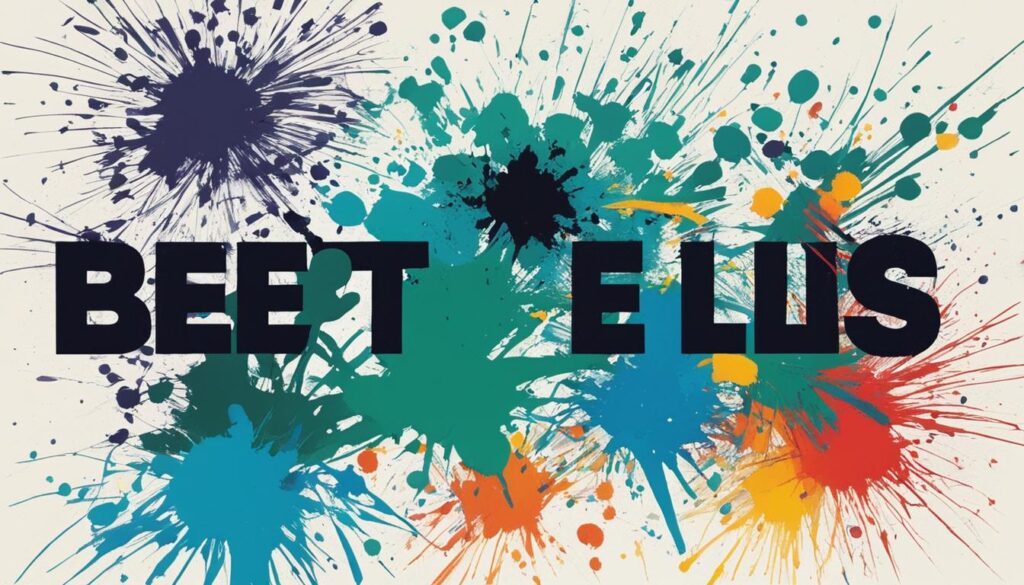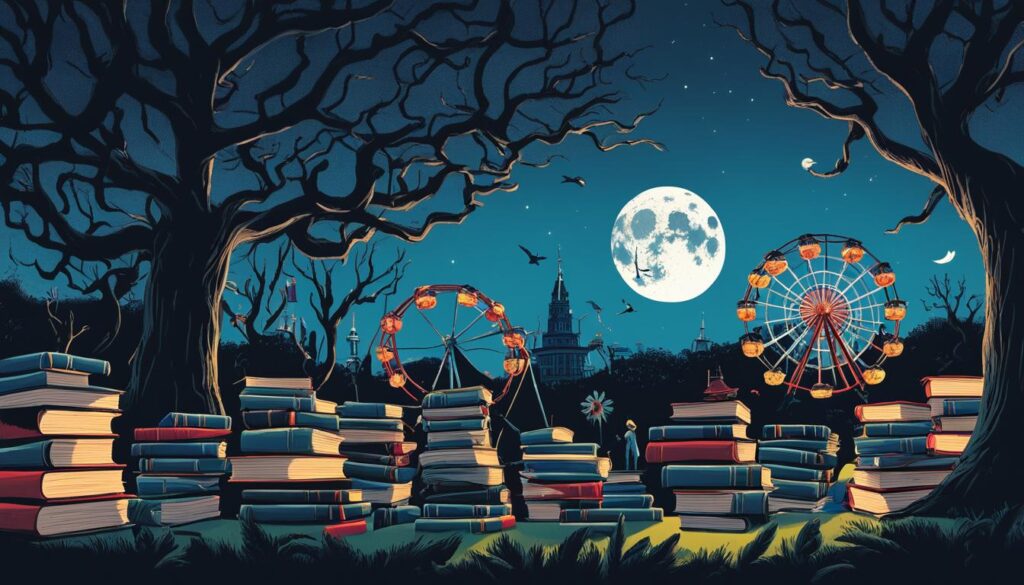Entering the haunting realm of horror satire, the audiobook adaptation of Lunar Park emerges as a compelling reiteration of Bret Easton Ellis’s chilling novel. This contemporary literature audiobook critique delves into the mastery behind the auditory storytelling, examining how it enhances the novel’s dark and satirical underpinnings. Renowned for his abrasive and introspective narratives, Ellis’s works have consistently pushed the boundaries of fiction, and this audiobook is no exception. The review unpacks the nuances of the narration, the reception of its audio translation, and the psychological tenor that resonates with its audience.
The eerie essence of Lunar Park—now captured in an audiobook format—presents a novel experience for Ellis aficionados and horror literature enthusiasts alike. Through this detailed Lunar Park review, understand how the shift from page to soundscapes breathes new life into the story and confirms Ellis’s enduring impact in contemporary literature.
Introduction to Bret Easton Ellis’s “Lunar Park”
The journey through the pantheon of contemporary horror novels invariably leads to the intriguing works of Bret Easton Ellis. Ellis, a figure renowned for his literary achievements, has etched a significant mark with his bold narrative style and provocative themes. Among his works stands “Lunar Park”, a novel that seamlessly blends the real with the surreal, offering readers a fascinating vortex of horror and satirical wit.
An enigmatic cornerstone in Ellis’s oeuvre, “Lunar Park”, opens the door to a realm where the author’s metafictional approach twists into a literary funhouse mirror. With the detailed fabric of a suburban gothic tale, Ellis confronts his own phantasms and those of society, creating a compelling narrative that stands out in the domain of modern horror literature.
As we delve into an overview of this unique novel, “Lunar Park” is not just an evocative narrative experience but a deep reflective pool of Ellis’s personal and professional hauntings. It juggles themes such as identity, the burdens of creativity, and the stark analysis of the human condition, all under the brooding shadow of horror.
| Bret Easton Ellis’s Preceding Works | Conceptual Themes | Impact in Horror Genre |
|---|---|---|
| “American Psycho” | Dissection of Materialism and Superficiality | Set new standards for psychological thriller narratives |
| “Glamorama” | Celebrity Cultures and the Veil of Illusion | Raised commentary on the intrusion of terror in glamour |
| “Lunar Park” | Autofictional Horror and Examination of Fatherhood | Blurred the boundaries between author’s life and fictional horror |
In considering the initial reactions to “Lunar Park”, readers and critics alike were ensnared by its uniqueness, cementing Ellis’s status as a master craftsman capable of reinventing the horror genre. The novel’s reception was a testament to its potency and solid placement within Ellis’s catalog of narrative artistry.
As the dread builds and the fabric of reality becomes increasingly threadbare, “Lunar Park” extends an invitation to explore what lies beneath the surface of our polished existences, making us question the ghosts that we all, in our ways, wrestle with. – Initial Review of “Lunar Park”
Plot Synopsis of “Lunar Park”
Lunar Park, a novel that distills haunting fiction and psychological twists, takes readers—or in this case, listeners—on a uniquely chilling journey. Bret Easton Ellis masterfully blends reality with the surreal, crafting a plot synopsis that defies the norms of traditional narrative archetypes.
The Haunting Premise of “Lunar Park”
The story begins with a semi-autobiographical introduction by the protagonist, who shares the name with the author. It quickly spirals into an unsettling mixture of domestic life and supernatural occurrences. As the line between fiction and reality blurs, the protagonist wrestles with past demons, unresolved relationships, and a series of eerie events that evoke a sense of pervasive dread, characteristic of Ellis’s Lunar Park summary.
Twists and Turns in Ellis’s Narrative
Listeners are drawn deeper into the narrative through a labyrinth of unexpected developments. Ellis keeps his audience on the edge of their seats with cleverly disguised foreshadows and sudden narrative leaps that underscore the novel’s essence as haunting fiction. The psychological twists are particularly effective in audio form, where the imagination is free to envision the increasingly distorted world Ellis depicts.
Carrying his signature style, Ellis delves into themes of identity, fame, and the haunting impact of one’s artistic creations. The plot of Lunar Park unfurls in a space where the surreal becomes real, and the fears of the protagonist materialize in ways that echo the deepest anxieties of modern existence.
The seamless weaving of a seemingly familiar suburban life with uncanny incidents constructs a narrative that redefines terror. In this literary construct, Ellis explores the psyche of a haunted writer, leading listeners through a maze of introspection and supernatural terror that only a novel like Lunar Park can offer.
The innovative structure and delivery of Lunar Park contribute to its status as a keystone of contemporary horror-satire, reaffirming Bret Easton Ellis’s command over the genre. This plot synopsis serves as a mere prelude to the intricate dance of reality and fiction that Ellis has choreographed, leaving listeners anticipating each successive step with a mixture of intrigue and trepidation.
Characters and Development in “Lunar Park”
The intricacies of character analysis and narrative development are crucial to the immersive experience of Bret Easton Ellis’s “Lunar Park”. This section delves into the multifaceted fictional personalities and dynamic characters that Ellis has crafted. Their journeys, conflicts, and evolutions are not only central to the plot but also act as a window into the author’s thematic intentions.
Focusing on the main protagonists, we witness a spectrum of personalities, each embodying different facets of human experience. Their arcs are meticulously woven into the fabric of the story’s universe, influencing the listener’s attachment to the audiobook. As these characters face their inner demons and external challenges, they become reflectors of the novel’s core themes.
One of the hallmarks of Ellis’s writing is the depth of the relationships between his characters. These interactions not only drive the plot forward but also serve to underscore the psychological and thematic layers of the narrative. Below is a table illustrating the complexity of these relationships and how they are pivotal to both narrative progression and character transformation:
| Character Interaction | Impact on Narrative | Character Development |
|---|---|---|
| Protagonist and Antagonist Confrontation | Central conflict escalates, heightening tension and engagement | Protagonist’s resolve and growth is tested |
| Family Dynamics | Backstory and underlying motives are revealed | Enhances emotional depth and elicits empathy |
| Alliance and Betrayal | Plot twists and turns, challenging listener expectations | Friendships evolve, trust is questioned, leading to self-discovery |
| Mentorship Bond | Provides knowledge and tools for overcoming obstacles | Mentee matures and harnesses inner strength |
Contributions from literary critiques and reader insights offer a rich tapestry of interpretations regarding these individuals’ journeys. These sources, in tandem with the narrator’s perspicacious rendition of the characters, ensure that “Lunar Park’s” personalities remain indelible in the audience’s mind, embodying the essence of compelling storytelling.
Indeed, the potency of a narrative lies not only in its plot but in the vibrancy of its characters and their growth throughout the course of a tale.
Themes and Symbolism in “Lunar Park”
The exploration of deep-seated themes and the use of intricate symbolism are critical cogs in the narrative machine of Bret Easton Ellis’s “Lunar Park”. Central to these thematic explorations are the profound dissections of substance abuse in fiction and the painful paths toward redemption. The novel also lays bare the complex paternal relationship dynamics that thread through the storyline, a nod to the emotional turmoil of its characters. Symbolism within this horror milieu serves as a conduit for deeper meaning and a mirror to the protagonists’ internal struggles.
Exploring Substance Abuse and Redemption
“Lunar Park” carefully layers the theme of addiction, depicting the protagonist’s grapple with substance abuse as a haunting echo of desire and destruction. To understand such a critical element of the story, it’s essential to discern how redemption is portrayed not just as an end goal but as a process rife with setbacks and victories. Listeners of the audiobook have been particularly attuned to the immersive experiences of these themes, heightened by the narrator’s emotive delivery.
Paternal Relationships and Emotional Turmoil
Another major thematic avenue is the intricate paternal relationship dynamics that Ellis crafts. The emotional turmoil experienced by the characters showcases a potent study in the complexities of fatherhood within modern literature. Through these relationships, Ellis questions the nature of legacy, love, and the inimitable bond between father and child – all woven into the eerie tapestry of the book’s horror elements.
| Theme | Portrayal in “Lunar Park” | Impact on Listener Engagement |
|---|---|---|
| Substance Abuse | A vivid depiction of the protagonist’s struggles with addiction and his subsequent fight for sobriety | Deepens the emotional connection and adds a layer of gritty realism to the audiobook experience |
| Redemption | The narrative’s weaving in of the protagonist’s quest for personal salvation | Listeners resonate with the character’s journey, appreciating the growth and atonement depicted |
| Paternal Dynamics | Explores the convoluted feelings and relationships between fathers and their offspring | Engenders sympathy and a thoughtful introspection on familial relationships among the audience |
| Symbolism | Use of symbolic elements, such as the haunted house, to reflect internal struggles | Intensifies the horror ambiance and enriches the storytelling, compelling listeners to delve deeper into the symbolic meanings |
These layered thematic explorations make Bret Easton Ellis’s “Lunar Park” a compelling study in the human condition, replete with its foibles and its aspirations. As listeners dive into the audiobook’s narrative, the visibility of these themes becomes a pivotal axis around which the entire story spirals and evolves.
Critical Reception of “Lunar Park”
The journey taken by “Lunar Park” through the landscape of literary criticism illuminates a fascinating spectrum of reader and critic perspectives. As a prime example of Bret Easton Ellis’s novel acclaim, the book’s original reception was colored by anticipations and comparisons with his earlier work. However, with the advent of its audiobook format, new dimensions of appraisal have emerged.
Leading publications and esteemed literary critics often diverged in their analyses of “Lunar Park,” a trend that persisted into its life as an audiobook. Many critics lauded Ellis’s foray into semi-autobiographical horror, while others remained skeptical, feeling that the novel’s introspective haunts did not fully resonate. Across various platforms, audiobook reviews have provided a renewed context for these discourses, revealing how auditory storytelling nuances can shift the interpretive experience.
“A masterstroke of metafictional storytelling, ‘Lunar Park’ arrests readers with its blend of autobiographical elements and supernatural disturbances. The audiobook iteration only amplifies this haunting dance with reality.” – A prominent literary journal.
Foremost in the discussion of “Lunar Park’s” reception is the distinction in reader engagement between the printed page and the spoken narrative. Listener reviews brought to light the impact a strong narrative voice has on the gripping tale’s atmosphere. The intimacy of Ellis’s confessional tone, delivered through the close medium of audio, garnered both new appreciation and constructive critique.
- Depth of Characterization – The complexity of protagonist Bret Easton Ellis, both author and character, takes on new life when vocalized.
- Horror and Humor – Audiobook reviewers often praised the skilled balance of terror with sardonic wit, rendered chillingly effective by the narrator’s delivery.
- Immersive Ambience – The audiobook’s soundscape created a polarizing effect; some listeners found it captivating, while others missed the personal imposition of imagination granted by reading.
Ultimately, the critical reception of “Lunar Park,” especially in its audiobook form, reflects the mutable and personal nature of consuming literature. The paradoxical blend of subjective responses and critical consensus frames “Lunar Park” as an essential touchstone in understanding the enduring influence of Ellis’s narrative innovation.
Bret Easton Ellis’s Writing Style in “Lunar Park”
The unique literary craftsmanship of Bret Easton Ellis pervades every page of “Lunar Park”, setting a benchmark in contemporary horror literature. Ellis’s writing style, characterized by incisive prose and distinctive dialogue, drives the novel far beyond the boundaries of traditional horror narratives. Within the gyre of his metafictional storytelling, Ellis crafts a landscape where the inexplicable horrors are as tangible as the emotional turmoil of his characters. The audiobook rendition of “Lunar Park” encapsulates these qualities, offering listeners an immersive plunge into Ellis’s visceral world.

Ellis’s Distinctive Prose and Dialogue
Ellis’s writing style is marked not just by its clarity and brevity, but also by its rhythmic and almost hypnotic cadence. This resonates particularly well in an audiobook format, where narrative and dialogue merge seamlessly, fostering an intimate connection between the listener and the multifaceted characters that populate the haunting landscape of “Lunar Park”. Ellis’s ability to pen dialogue that is both authentic and laden with subtext adds a layer of depth that requires attentive listening, further engaging the audience in the psychological complexity of the story.
The Blending of Metafiction and Horror
In “Lunar Park”, Ellis ingeniously blends metafiction elements with a horror genre blend, manipulating the fabric of reality to ensnare the reader in a web of suspense. The text constantly winks at its own fictive nature, challenging the listener’s perception of what is real within the framework of the story. This commingling of the unreal and the all-too-real amplifies the horror elements, as the foundation of the narrative itself seems to tremble with uncertainty. The audiobook medium intensifies this experience, with the narrator’s voice conveying the unsettling sense that the story is aware of its own telling, and that the listener, by extension, is an intrinsic part of the narrative.
The Audiobook Experience
Embarking on the auditory journey of “Lunar Park” provides an audiobook immersion that is distinct from the traditional reading practice. The unique listening experience offered by audiobooks creates a realm of narrative engagement that elevates the storytelling medium to new heights. Below, we delve into various aspects of this experience, analyzing how the spoken word can amplify the book’s intrinsic qualities, while also facing certain hurdles not found within the pages of a print.
Listeners have attested that the audiobook version of “Lunar Park” creates an immersive atmosphere that might surpass that of the print edition. Through the subtleties of the narrator’s voice, the haunting elements of horror are given a palpable sense of urgency, one that manifests in shivers running down the spine, something mere words on a page might struggle to convey. It’s this capacity for dramatization, found within the realms of an audiobook, that augments the eerie and suspenseful tonality of Bret Easton Ellis’s storytelling.
| Aspect | Audiobook | |
|---|---|---|
| Engagement | Requires active imagination | Voice inflection adds depth |
| Accessibility | Requires light and focus | Convenient for multitasking |
| Horror Element | Limited to visual imagination | Enhanced by audio cues |
| Convenience | Physical or digital copy needed | Accessible through various devices |
Despite such advantages, the listening experience is not without its challenges. Some readers find difficulty in staying engaged with the narrative without the presence of text and may miss the opportunity to ponder over the subtleties of language—a testament to the divergent preferences in storytelling consumption.
The auditory elements featured in the “Lunar Park” audiobook enrich its harrowing narrative, turning it into an evocative and memorable experience.
Interestingly, the narrator’s insights reveal a deliberate approach to pace and emphasis, which enhance key moments of tension and introspection, further highlighting the differences in listener immersion. This suggests that an audiobook does not simply recite the text; it interprets, adds dimension, and can potentially change the very nature of the storytelling medium.
Data on audiobook consumption trends additionally signal a surge in popularity, suggesting that this format has tapped into a cultural vein that prizes narrative experiences that can be woven into the fabric of everyday life without the commitment required by print. As immersive technologies continue to progress, the divide between the audiobook and print experience may draw even wider, cementing audiobooks as a formidable and autonomous literary force.
Audiobook Review: Narration and Production Quality
The audiobook adaptation of “Lunar Park” brings with it a complex array of elements that contribute to the listener’s experience. A significant part of this experience is driven by the audiobook narration, which holds the power to pull listeners into the eerie world that Bret Easton Ellis has crafted. The narrator’s performance is pivotal, serving as the listeners’ guide through the story’s harrowing twists and immersive environments.
When evaluating the audio quality of this production, one must consider both the clarity of the sound and the sound design’s effectiveness in enhancing the narrative. Good production value can amplify the horror and suspense elements that are central to “Lunar Park,” while poor production can detract from the story’s impact.
Through a meticulous balance of tone and pacing, the narrator breathes life into Ellis’s characters, each with a distinct voice that maintains listener engagement from start to finish.
Further assessment of the audiobook reveals that attention to detail in audio production has not been spared. Listeners have expressed particular appreciation for the subtleties in the soundscapes that flank the narration, crafting an atmosphere that is as immersive as it is unsettling.
Here is a glimpse into the responses it has garnered from the audience:
- High praise for the intonation and emotion the narrator brings to each chapter
- Satisfaction with the resonance and clarity of sound, making for an easy listening experience
- Positive feedback on the engrossing pace, ensuring the story unfolds with apt tension and tempo
- Admiration for the production team’s use of subtle sound effects to deepen the sense of horror without overwhelming the narrative
As we analyze the performance reviews of the narrator, it becomes evident that a deft hand in narration can transform the written word into a palpable and haunting auditory journey. The narrator’s adept articulation and understanding of the material play a central role in actualizing the suspense that “Lunar Park” demands.
In conclusion, the production quality, coupled with skillful narrator performance, establishes the “Lunar Park” audiobook as an exemplar in its field. It showcases how technical finesse and narrative eloquence intersect to create an audiobook experience that both honors and elevates the original text.
Comparing “Lunar Park” to Ellis’s Other Works
In examining the opus of Bret Easton Ellis, one cannot help but draw connections and contrasts between his novels, particularly when juxtaposing “Lunar Park” with the infamous “American Psycho.” This literary comparison not only offers insight into the American Psycho comparison against Ellis’s later work but also presents a rich tapestry of thematic developments that reveal Bret Easton Ellis’s literary evolution over the years.

“Lunar Park” vs. “American Psycho”
Despite sharing a satiric edge, “American Psycho” and “Lunar Park” diverge significantly in their themes and narrative approaches. While “American Psycho” delves into the excesses of 1980s consumerism embodied by the enigmatic Patrick Bateman, “Lunar Park” takes a more introspective turn, weaving elements of horror into a semi-autobiographical tapestry. The former takes critique to the brink of hyperbole, whereas the latter blurs the lines between reality and fiction, creating a personal hauntology that is as much about the author himself as it is the characters within the story.
The Evolution of Ellis’s Literary Themes
Over time, the thematic focus of Ellis’s work has shifted from the external decadence and the hollowness of materialism towards a more internal landscape of redemption and the ghosts of past errors. Analyzing how these maturing themes are seasoned through Ellis’s career allows readers and scholars alike to trace a narrative of personal and creative growth.
| Aspect | “American Psycho” | “Lunar Park” |
|---|---|---|
| Main Theme | Consumerism and Identity | Redemption and Fatherhood |
| Setting | 1980s Manhattan | Suburban America in the 2000s |
| Protagonist | Patrick Bateman, a Wall Street yuppie | Bret Easton Ellis, an author facing his demons |
| Narrative Style | First-person, unreliable narrator | Metafiction with autobiographical elements |
| Critical Reception | Controversial and polarizing | Reflective and resonant with fans and critics |
Through this literary comparison, it becomes evident how “Lunar Park” offers a more mature and introspective Bret Easton Ellis, one who looks inward at the fears and failures that shape human experience. As Ellis continues to evolve as a writer, his progression invites readers to explore complex emotional landscapes that transcend the shock value of his earlier works, such as “American Psycho.”
Conclusion
In synthesizing our exploration of Bret Easton Ellis’s “Lunar Park” in audiobook form, it is clear that the medium provides a unique lens through which we experience this multifaceted work. We ventured beyond mere final thoughts to gauge the intimate and eerie resonances that the audiobook format impresses upon listeners. The inflections and pacing of the narration intensify the novel’s haunting ambiance, while the thematic depth of Ellis’s writing is rendered with new nuances in this auditory scape.
This audiobook wrap-up discerns that the intimate nature of audiobook storytelling has conferred upon “Lunar Park” a conclusion that reverberates with personal and literature reflections. The experience illuminates the psychological layers of the narrative and has influenced perceptions of the novel, securing its place in the pantheon of contemporary literature. Insights from narrators and producers further illuminate the meticulous care taken to preserve the novel’s tone and thematic integrity.
Ellis’s canon, marked by his distinctive contributions to contemporary narratives, is augmented by the audiobook rendition of “Lunar Park”. This extended format has not only served as a testament to the novel’s enduring appeal but has also etched the book more profoundly into the consciousness of its listeners. The lasting significance of “Lunar Park” not only celebrates Ellis’s legacy but also emphasizes the rich, evolving landscapes audiobooks offer to the literary community at large.



